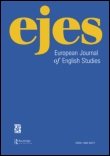
European Journal of English Studies
Scope & Guideline
Fostering Innovative Research in Literature and Linguistics
Introduction
Aims and Scopes
- Interdisciplinary Exploration of Literature:
The journal emphasizes a broad interdisciplinary approach, examining literary texts not only in isolation but also in relation to cultural, historical, and social contexts. - Focus on Contemporary and Historical Contexts:
It examines both contemporary and historical literatures, offering insights into how past and present narratives interact and inform each other. - Engagement with Digital and Social Media:
The journal addresses the impact of digital platforms on literature and poetry, particularly through the lens of contemporary phenomena like Instapoetry and social media's influence on literary forms. - Thematic Studies of Space and Identity:
There is a consistent focus on themes of space, identity, and the human-nonhuman relationship, reflecting on how these concepts are represented in literature. - Critical Gender Studies:
The journal provides a critical examination of gender issues within literature, often addressing feminist and anti-feminist discourses, and exploring their implications in contemporary contexts. - Ecocritical Perspectives:
A growing area of focus includes ecocritical readings, particularly in the context of climate change and environmental issues, highlighting literature's role in discussing anthropocentric themes.
Trending and Emerging
- Ecocriticism and Anthropocentric Themes:
There is a marked increase in ecocritical studies that explore the relationship between literature and environmental concerns, particularly in light of the Anthropocene, indicating a growing awareness of ecological issues. - Digital Literature and Instapoetry:
The exploration of digital platforms and their impact on poetry and literature is gaining momentum, with several papers examining the aesthetics and social implications of Instapoetry. - Interdisciplinary Approaches to Space:
Recent works increasingly focus on the concept of space—both physical and metaphorical—examining how spaces influence identity and narrative, particularly through the lens of interstitiality. - Human-Nonhuman Relationships:
Emerging discussions on human-nonhuman relationships and inter-creatural empathy reflect broader societal conversations about empathy and coexistence in a rapidly changing world. - Contemporary Feminist Movements:
The journal is increasingly addressing contemporary feminist movements and their literary representations, showcasing a dynamic engagement with current feminist discourse.
Declining or Waning
- Traditional Literary Criticism:
There seems to be a decline in papers that engage with traditional literary criticism methods, as more submissions focus on interdisciplinary approaches and contemporary issues. - Historical Literary Figures:
The focus on classical authors and their works appears to be less frequent, with a shift towards modern and contemporary texts that resonate more with current societal issues. - Static Gender Studies:
While gender studies remain a core theme, static or traditional approaches to gender analysis are becoming less prominent, giving way to more dynamic discussions surrounding intersectionality and contemporary movements. - Regional Literature Focus:
There is a noticeable reduction in studies focusing solely on regional literature, as global perspectives and transnational themes gain more traction in recent publications.
Similar Journals

Complutense Journal of English Studies
Fostering Innovation in Language and LiteratureThe Complutense Journal of English Studies, published by the Universidad Complutense de Madrid, is a prominent Open Access journal dedicated to advancing the field of English language and literature studies. Established in 2014, this journal provides a vital platform for researchers, educators, and students to disseminate original research, critical analyses, and creative works that contribute to the understanding of English studies in a global context. With its commitment to quality scholarship, the journal seeks to enhance interdisciplinary dialogues and foster new insights into contemporary linguistic and literary issues. Although it currently does not have a designated HIndex or Scopus Rank, its accessibility ensures that a wide audience can engage with a diverse range of scholarly contributions. Located in the heart of Madrid, the journal embraces an inclusive approach to the study of English, inviting submissions that reflect both traditional paradigms and innovative perspectives.

Revista de Letras
Nurturing a Vibrant Community of Literary ScholarsRevista de Letras is an esteemed academic journal published by Universidade Estadual Paulista (UNESP), dedicated to the fields of Literature and Literary Theory, as well as Philosophy. With its ISSN 0101-3505 and E-ISSN 1981-7886, the journal serves as a significant platform for the dissemination of scholarly research and critical thought, particularly within the Brazilian context and beyond. Operating from Araraquara, SP, Brazil, the journal spans the period from 2004 to 2023, featuring a diverse array of articles aiming to explore various literary and philosophical discourses. Despite its current Q4 ranking in both the Literature and Literary Theory and Philosophy categories, the journal continues to foster a vibrant academic community, promoting rigorous scholarship and intellectual engagement. Researchers, professionals, and students alike are invited to contribute to and engage with the evolving narratives presented in this publication, aiming to enhance understanding and facilitate discussions within these crucial fields.

Alicante Journal of English Studies-Revista Alicantina de Estudios Ingleses
Exploring the Depths of English StudiesAlicante Journal of English Studies - Revista Alicantina de Estudios Ingleses, published by the esteemed University of Alicante since 2003, is a vital platform for researchers and scholars in the fields of Cultural Studies, Linguistics and Language, and Literature and Literary Theory. With an impressive impact factor reflected by its Q1 and Q2 rankings across various categories in 2023, the journal consistently delivers high-quality peer-reviewed articles that push the boundaries of knowledge and discourse in English studies. Operating under an Open Access model, it ensures that research is freely accessible to a global audience, thereby fostering collaboration and advancement within the academic community. The journal's commitment to excellence is further underscored by its Scopus rankings, which place it in the top percentiles of literature and cultural studies. Its scope for the converged years from 2019 to 2024 promises continued relevance and innovation, making it an essential resource for professionals, researchers, and students alike who seek to deepen their understanding of English studies.

Litera-Journal of Language Literature and Culture Studies
Connecting Scholars through Language and LiteratureLitera - Journal of Language Literature and Culture Studies is a pioneering open-access journal published by the esteemed Istanbul University, Faculty of Letters, since 2017, dedicated to the in-depth exploration and critical analysis of language, literature, and cultural studies. With an ISSN of 1304-0057 and an E-ISSN of 2602-2117, the journal aims to foster a diverse discourse within the arts and humanities, particularly in literature and literary theory, linguistics, and cultural studies. Although it currently holds a modest Scopus rank among its peers, it serves as a valuable platform for emerging scholars and seasoned researchers alike, aiming to enhance understanding and appreciation of cultural narratives within the global context. The journal provides a unique opportunity for authors and readers to engage with original research, critical reviews, and creative works that are vital to the advancement of interdisciplinary studies. Based in Istanbul, Turkey, it is positioned at the heart of cultural exchange, making it a significant contributor to scholarly communication in the region and beyond.

SARE-Southeast Asian Review of English
Transforming Communication and Literature in the Southeast Asian ContextSARE-Southeast Asian Review of English, published by the University of Malaya's Faculty of Arts and Social Sciences, serves as a vital platform for scholarly discourse in the realms of communication, cultural studies, linguistics, and literature. With the ISSN 0127-046X and E-ISSN 0127-046X, this esteemed journal has embraced Open Access since 2016, fostering a wider dissemination of knowledge to researchers, professionals, and students alike. Residing in the diverse academic landscape of Malaysia, it has emerged as a significant contributor to regional and global discussions in English studies. In the 2023 category quartiles, SARE boasts impressive standings, notably Q2 in Literature and Literary Theory and Q3 in Cultural Studies, reflecting its commitment to high-quality, impactful research. Furthermore, its Scopus rankings highlight its relevance across various disciplines, exemplifying its role in advancing interdisciplinary scholarship. Authors and contributors are encouraged to engage with the journal's expansive scope, as it navigates the rich tapestry of Southeast Asian English literature and communication.
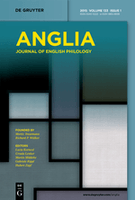
ANGLIA-ZEITSCHRIFT FUR ENGLISCHE PHILOLOGIE
Connecting Scholars Through Rich Literary DiscourseANGLIA-ZEITSCHRIFT FUR ENGLISCHE PHILOLOGIE, published by WALTER DE GRUYTER GMBH, stands as a significant periodical in the fields of Linguistics and Literary Theory. With a rich publication history dating back to 1878 and ongoing contributions until 2024, this esteemed journal serves as a vital resource for researchers, professionals, and students interested in the evolution of the English language and literature. Although it does not currently offer open access, its rigorous peer-reviewed articles have secured a respectable standing, ranking Q3 in Linguistics and Language and Q2 in Literature and Literary Theory as of 2023. The journal, located in Berlin, Germany, continues to drive academic discourse and foster scholarly engagement in the intricacies of English philology, making it an essential platform for the latest research and developments in the field.
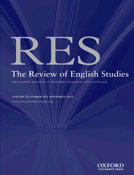
REVIEW OF ENGLISH STUDIES
Fostering Innovative Research in English StudiesREVIEW OF ENGLISH STUDIES, published by Oxford University Press, is a prestigious journal that has been advancing the fields of Literature and Literary Theory as well as Linguistics and Language since its inception in 1925. With an impressive impact factor and a commendable ranking, placing it in the Q1 and Q2 categories across relevant disciplines, the journal serves as a vital platform for researchers, scholars, and students alike. Covering a wide range of topics from classical literature to contemporary linguistic analysis, REVIEW OF ENGLISH STUDIES is committed to fostering scholarly discourse and promoting innovative research methodologies. Although it does not offer open access, the journal is highly regarded for its rigorous peer-review process and high-quality publications, making it an essential resource for anyone engaged in English studies. For researchers seeking to keep abreast of the latest developments in the field, this journal stands as an indispensable guide and repository of knowledge.
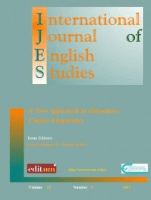
International Journal of English Studies
Fostering Dialogue in the World of English StudiesInternational Journal of English Studies, published by UNIV MURCIA, is a leading open-access journal dedicated to the multifaceted exploration of English studies, encompassing literature, linguistics, cultural studies, and education. With its ISSN 1578-7044 and E-ISSN 1989-6131, this journal has been a vital platform for scholarly communication since 2001, fostering innovative research and dialogues in the field. Hailing from Spain, it enjoys a noteworthy reputation, as evidenced by its impressive rankings in various categories: Q2 in Cultural Studies, Q4 in Education, Q2 in Linguistics and Language, and Q1 in Literature and Literary Theory, as of 2023. Its impactful presence is reflected in the Scopus Rankings, positioning it within the top tiers of its categories, including a rank of #51 out of 1106 in Literature and Literary Theory and a 95th percentile ranking overall. The journal is committed to enhancing academic discourse by publishing high-quality research articles, reviews, and critical essays that together contribute significantly to the fields of English studies. As it converges from 2013 to 2024, the International Journal of English Studies invites researchers, professionals, and students alike to delve into its rich repository of knowledge.

Letras de Hoje-Estudos e Debates em Linguistica Literatura e Lingua Portuguesa
Unlocking New Perspectives in Linguistics and LiteratureLetras de Hoje-Estudos e Debates em Linguistica Literatura e Lingua Portuguesa, published by EDITORA UNIV PONTIFICIA UNIV CATOLICA RIO GRANDE SUL-EDIPUCRS, is a leading academic journal in the fields of linguistics, literature, and the Portuguese language. With an esteemed history dating back to 1967, it has proudly maintained an Open Access model, making significant scholarly contributions accessible to researchers, professionals, and students worldwide. The journal serves as a crucial platform for the exchange of innovative ideas, critical discussions, and extensive research findings targeting both theoretical and applied dimensions of language studies. The commitment to fostering community engagement and interdisciplinary dialogue underscores its importance within the academic landscape, encouraging submissions that challenge conventional paradigms and explore the complexities of Portuguese linguistics and literature. For those involved in these dynamic fields, Letras de Hoje remains an essential resource for advancing knowledge and supporting scholarly discourse.
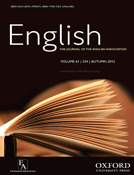
ENGLISH
Cultivating a Rich Discourse in Literary StudiesENGLISH, published by Oxford University Press, is a distinguished journal in the field of Literature and Literary Theory, holding a solid place in the academic community with its Q3 ranking in the 2023 Category Quartiles. With the ISSN 0013-8215 and E-ISSN 1756-1124, this journal has been an essential platform for scholarly discourse from 2003 to 2023. It caters to a diverse audience, including researchers, academics, and students, by providing insightful articles that delve into various dimensions of English literature. While it is not an open access journal, it continues to be recognized for its valuable contributions, as reflected in its Scopus ranking of #297 out of 1106 in the Arts and Humanities, situating it in the 73rd percentile. The journal's commitment to enhancing the study of literature makes it an invaluable resource for those seeking to expand their understanding of literary theory and practice.